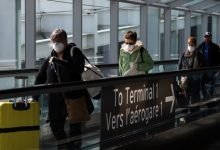Exemption coming for families separated by COVID-19 travel restrictions
Canada will begin to allow some family members separated by temporary COVID-19 travel restrictions to enter the country.
“We are bringing in a limited exemption to allow immediate family members of citizens or permanent residents to come to Canada,” Prime Minister Justin Trudeau said today during his morning news conference. “This is an incredibly difficult time to be apart from a spouse, a child, or mom or dad.”
Anyone who enters the country will have to self-quarantine for 14 days, he said.
“And if you don’t follow these rules, you could face serious penalties.”
The Canada Border Services Agency said the exemption will kick in at midnight tonight. It applies to foreign nationals who are immediate family members of Canadian citizens and permanent residents, and who do not have COVID-19 or are showing any signs or symptoms of COVID-19, “or who do not have reason to believe they have COVID-19.”
The government barred entry to most non-residents and permanent residents back in March. Canada also has a deal with the United States until at least June 21 to temporarily close the border to non-essential travel (meaning no recreational visits) while keeping it open to commercial traffic and essential workers.
But a number of stories have emerged in the past few weeks of families stuck on opposite sides of the border, including expectant parents.
Through this exemption, the government is defining an ‘immediate family member’ as someone’s:
- Spouse or common-law partner
- Dependent child
- Parent or step-parent or the parent or step-parent of the person’s spouse or common-law partner;
- Guardian or tutor.








Redes Sociais - Comentários